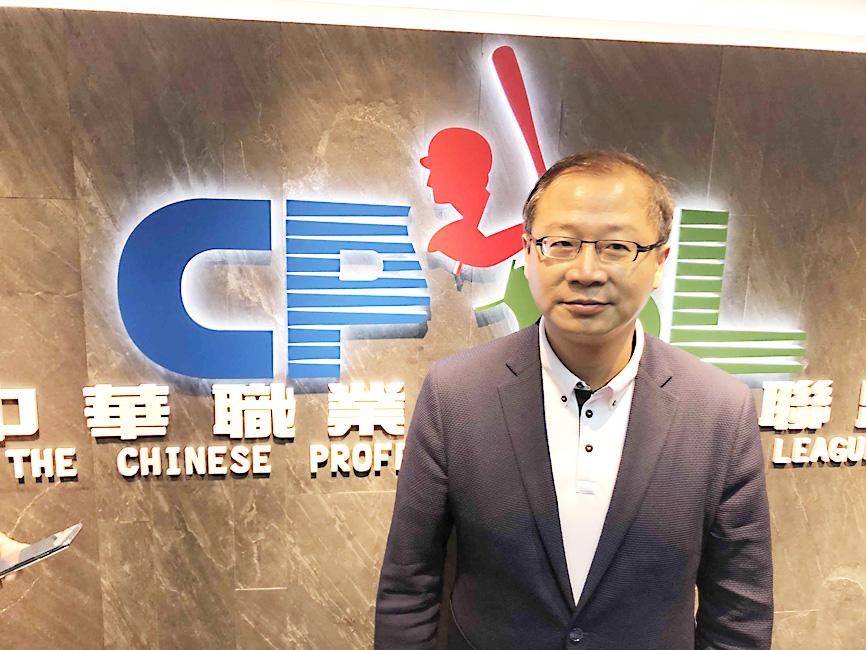The New Power Party (NPP) yesterday urged the CPBL to consider changing its title to avoid misunderstandings and to increase the exposure of the nation’s professional baseball games.
The party, which has also been asking the government to change the name of China Airlines Ltd (中華航空), raised the issue of CPBL’s name after the world’s first baseball season opener was played in Taiwan amid the COVID-19 pandemic.
No fans were allowed to watch the games at the ball parks.

Photo: CNA
“Because of the pandemic, games hosted by the CPBL have so far attracted millions of spectators from around the world. However, Jeffrey Bellone, a sports columnist in FanSided, has erroneously called the league ‘China Professional Baseball League,’” the NPP said on its Facebook page.
China’s professional baseball league, the China National Baseball League, was founded last year.
“It is little wonder that people were confused by these two leagues, because one has ‘Chinese’ in its title and the other one has ‘China.’ Do we really want to see people around the world calling our baseball players ‘Chinese baseball players?’” the NPP said.
Although the CPBL is a private organization, it received government funding after it was hit by game-fixing scandals, and fans have supported the league, despite the merger of two baseball leagues and multiple team ownership changes, it said.
Baseball should be considered a public asset, because people have equated the sport with national image and identity, rather than perceiving it as just a sport, the party added.
“The CPBL should quickly hear and integrate opinions on this matter from all stakeholders, and it should consider this matter from the perspective of raising the publicity of the nation’s professional baseball culture. The government, on the other hand, should explicitly express its position on this matter,” it said.
CPBL commissioner John Wu (吳志揚) last week said that the league is a private organization, adding that it is only the English-language name that is causing confusion.
“The country’s official title is the ‘Republic of China,’ so our name in Chinese does not cause any problems. This name carries 31 years of history, and we have to consider the necessity and efficacy of the name change campaign. This could potentially change our relations with the Sports Administration and international baseball organizations,” he said.

AIR SUPPORT: The Ministry of National Defense thanked the US for the delivery, adding that it was an indicator of the White House’s commitment to the Taiwan Relations Act Deputy Minister of National Defense Po Horng-huei (柏鴻輝) and Representative to the US Alexander Yui on Friday attended a delivery ceremony for the first of Taiwan’s long-awaited 66 F-16C/D Block 70 jets at a Lockheed Martin Corp factory in Greenville, South Carolina. “We are so proud to be the global home of the F-16 and to support Taiwan’s air defense capabilities,” US Representative William Timmons wrote on X, alongside a photograph of Taiwanese and US officials at the event. The F-16C/D Block 70 jets Taiwan ordered have the same capabilities as aircraft that had been upgraded to F-16Vs. The batch of Lockheed Martin

GRIDLOCK: The National Fire Agency’s Special Search and Rescue team is on standby to travel to the countries to help out with the rescue effort A powerful earthquake rocked Myanmar and neighboring Thailand yesterday, killing at least three people in Bangkok and burying dozens when a high-rise building under construction collapsed. Footage shared on social media from Myanmar’s second-largest city showed widespread destruction, raising fears that many were trapped under the rubble or killed. The magnitude 7.7 earthquake, with an epicenter near Mandalay in Myanmar, struck at midday and was followed by a strong magnitude 6.4 aftershock. The extent of death, injury and destruction — especially in Myanmar, which is embroiled in a civil war and where information is tightly controlled at the best of times —

Taiwan was ranked the fourth-safest country in the world with a score of 82.9, trailing only Andorra, the United Arab Emirates and Qatar in Numbeo’s Safety Index by Country report. Taiwan’s score improved by 0.1 points compared with last year’s mid-year report, which had Taiwan fourth with a score of 82.8. However, both scores were lower than in last year’s first review, when Taiwan scored 83.3, and are a long way from when Taiwan was named the second-safest country in the world in 2021, scoring 84.8. Taiwan ranked higher than Singapore in ninth with a score of 77.4 and Japan in 10th with

SECURITY RISK: If there is a conflict between China and Taiwan, ‘there would likely be significant consequences to global economic and security interests,’ it said China remains the top military and cyber threat to the US and continues to make progress on capabilities to seize Taiwan, a report by US intelligence agencies said on Tuesday. The report provides an overview of the “collective insights” of top US intelligence agencies about the security threats to the US posed by foreign nations and criminal organizations. In its Annual Threat Assessment, the agencies divided threats facing the US into two broad categories, “nonstate transnational criminals and terrorists” and “major state actors,” with China, Russia, Iran and North Korea named. Of those countries, “China presents the most comprehensive and robust military threat